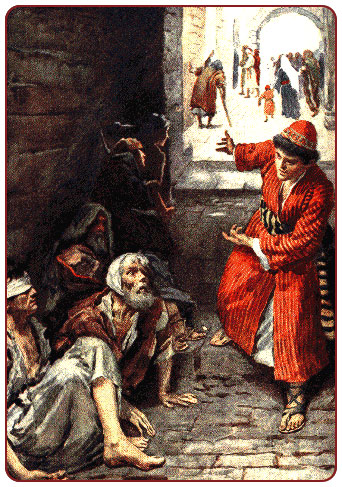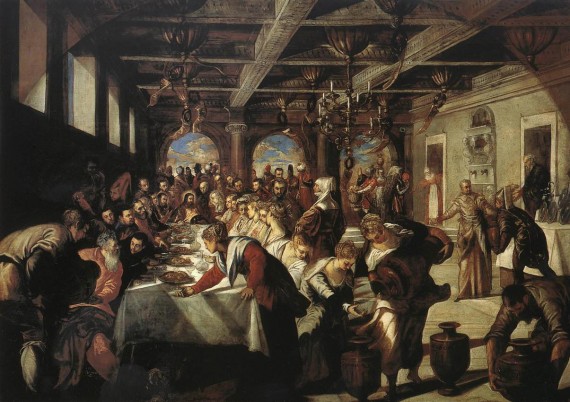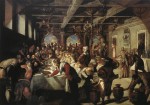In a previous post we looked at the statement of Jesus in Matthew 20 that “many are called, but few are chosen.”
This post looks at the identical statement in Matthew 22:14, which also follows a parable from Jesus.
The Parable of the Wedding Feast in Matthew 22:1-14
This parable in Matthew 22:1-14 is sort of two parables in one.
In the first half of this parable (Matthew 22:1-10), a king prepared a wedding feast and invited many people to the feast. When the day of the feast arrived, the king sent out servants to remind those whom he had invited that the day had come. Such double invitations are not uncommon in honor-shame cultures, for they allow the invited guests time to look over the preparations for the feast and who else is invited so that they can decide whether or not they will attend.
 In this case, all the guests decided to stay away, and provided their token excuses, which indicated their disapproval (Malina, Synoptic Gospels, 111). Also, many of them sized the servants of the king to beat them and kill them, which was a direct affront to his honor.
In this case, all the guests decided to stay away, and provided their token excuses, which indicated their disapproval (Malina, Synoptic Gospels, 111). Also, many of them sized the servants of the king to beat them and kill them, which was a direct affront to his honor.
So the king sent out his servants again to find anybody he could who would attend his wedding feast. They gathered whomever they found, both good and bad, and brought them to participate in the joy of the king.
This first part of the parable is primarily about how Israel as God’s chosen people had been invited to participate in the party that accompanied the arrival of the Messiah. But when Jesus arrived, most of those in Israel wanted nothing to do with Jesus. So Jesus invited the sinners, tax-collectors, and prostitutes instead. The chief priests and Pharisees obviously did not like to hear this sort of message from Jesus and sought for ways to arrest and kill Him (cf. Matthew 21:45-56; 22:15).
The second half of the parable, which is almost a separate parable itself, is about a man who shows up at the feast without the proper wedding attire (Matthew 22:11-13). The king asks how the man got into the wedding without the proper clothing, and when the man is unable to provide an answer, the king has him thrown out of the wedding hall and into the darkness outside.
This seems strange to modern hearers, for what else could the king expect from people he had rounded up from the streets and back alleys? Why would a homeless man have proper wedding attire? The answer is that in such situations of the Mediterranean culture, the king would make sure to provide proper wedding clothes to all of his guests as they arrived (Malina, Synoptic Gospels, 111. Cf. also Stern, Jewish NT Commentary, 64, and Pilch, Cultural World of Jesus, 148-150).
So the king’s question to the improperly dressed man is not so much, “Why aren’t you wearing the right clothes?” but rather, “How did you get in here? If you had come in by the front gate, you would have been given proper clothing. The fact that you are wearing improper clothing indicates you came in by some other way.”
This is reminiscent of Jesus’ earlier statement that only thieves and robbers enter a sheepfold by coming over a wall (John 10:1). Everyone else comes in through the front gate. The implication is that this man who was in the feast without the proper clothes was a thief who climbed in over a wall. Most ironically, of course, is that there were likely many thieves in the wedding feast, but they had come in through the front door and so were given proper wedding attire.
For Many are Called, but Few are Chosen (Matthew 22:14)
Following the conclusion of this parable, Jesus once again makes the statement, “For many are called, but few are chosen” (Matt 22:14).
As with the previous usage of this summary conclusion in Matthew 20:16, Jesus is not saying anything one way or another about how God sovereignly chose some people to go to heaven while others go to hell.
In fact, though many read “hell” into Jesus’ statement in Matthew 22:13 about the outer darkness and the weeping and gnashing of teeth, this imagery has nothing to do with hell at all, but simply portrays the profound regret which is experienced by those who are outside the hall of the wedding feast. They are not inside, with the food, the light, and the dancing, but are in the darkness outside. The weeping and gnashing of teeth is a Middle Eastern way of expressing regret and shame. The bottom line, of course, is that there is nothing in Matthew 22:1-14 about Unconditional Election.
Many were invited to participate in the feast, but only those who showed up and came through the front door got to join in the celebration.
This sort of a statement would have been offensive to many Jews at the time, for they considered themselves to be God’s only chosen people.
Jesus is not denying their “chosenness,” but is saying that if they do not live up to the reason they were chosen by God, which is to serve others and be a blessing to the world, then God will simply choose others, such as the prostitutes, thieves, and cutpurses. And if it is argued that they are not worthy, that they are not clothed in righteousness, Jesus says, “Don’t worry. They’ll be given the proper attire as they enter into the wedding hall.”

Jesus is saying that while many people were called to participate in His Kingdom, only those who show up are “chosen” to join in the festivities (Cf. discussion in Klein, The New Chosen People, 67-69). But you have to come in the right way, which is through the front door, for only in this way will the guests be properly attired to live, serve, and function within God’s Kingdom (See Capon, Kingdom, Grace, Judgment, 464-465).
There is nothing here to portray either calling or election as some kind of irresistible decree that a person should repent and believe (Marston and Forster, God’s Strategy in Human History, 164).
Many of those who were invited (called) to the wedding resisted the invitation, and those who came were given the proper clothing so that they might be full participants in the wedding celebration of the Kingdom of God. To participate in the Kingdom, you must be wearing Kingdom clothes.
The condition of the wedding garment is given as solid interpretation [cf. Matthew 21:31, 21:43], but because he brings disobedience to the wedding, and does not have the conduct which corresponds to blessing, he cannot be a real participant. Election is fulfilled only in obedience. Hence we do not have here a static doctrine of election but a dynamic theology which is oriented to the right attitude of the elect. To receive gifts is of no avail if there is no readiness to obey. Thus the concept of election is set in living history. It demands responsibility and decision (Kittel, TDNT, II:186).
In summary then, when Jesus says in Matthew 22:14 that “many are called, but few are chosen,” He is not laying out the doctrine of Unconditional Election, but is saying that when God invites all to participate with Him in His rule and reign on earth, He does so without partiality or favoritism.
All are invited, and it does not matter who shows up first or last, all will be welcomed. Those who accept the invitation, however, must recognize that while they will be given blessings and benefits from the overabundance of God’s generosity, these blessings and benefits must be gained the right way (by entering through the front door, which is Jesus), and must be used in the service of others.
If you want to read more about Calvinism, check out other posts in this blog series: Words of Calvinism and the Word of God.



It’s tempting to interpret this through Calvinist lens. But I think it’s best to understand it in context of Jesus’ time. Jesus was an apocalyptic prophet that believed God’s reign was about to break in soon (not 2000yrs later) and so a lot of his statements have a very dire and urgent as well as end-of-the-world tone. He did not believe many would follow him because of the radically different message he preached. This should not be understood as a once and for all time statement about every person on earth. It does fit with apocalyptism and would be best understood in that context. In today’s context, it might mean that many know about Christ but few live out his message.
Good read!
This verse is often quoted as if God was the one who did the choosing, but in fact it is solid evidence that God chooses those who first choose Him.
It is clear that the “chosen” are “chosen” because, as well as God choosing them, they chose God
Thanks for the encouragement! I don’t actually hold to the view that God chooses those who first choose Him, but I know it is a common view.
i agree with you, its God who chooses us to the other way round, he invites us and we reciprocate…. Continue enlightening people. i like your article keep it up, it has helped me..
Fed up of this stupidity…why are you trying to interpret everything based on your thoughts.The spirit reveals the truth
We can’t understand the word of god unless its meaning is revealed by the spirit of God.Let us cry for that spirit…until then we are all blinded by our carnal nature(self-centered sinful life)
@Godfrey, The meaning of God’s word is not hidden to those who have His Spirit. Jeremy has the Spirit of God, and is following the scriptures, which teach that the Spirit helps us understand the written Word, as we carefully and diligently study it. This calls upon us to use our mind. We (believers) all have the choice of walking in the Spirit or not, which will determine whether we are more carnally minded, or more spiritually minded. See 1 Cor. 2:7 – 3:3; Rom. 8:3-9; Eph. 4:20-25.
Thank you Steve. Yours is a kindly and wise response. Even when we do follow the Spirit we do not all reach the same conclusions.
Thanks, Steve. I don’t mind when people disagree, but hopefully they can understand that our disagreements are not because one has the Spirit and another doesn’t. You point that out well.
Chosen is the term I get hung up on.
MANY ARE CALLED, FEW ARE CHOSEN. This sounds like a Casting call where many are called to come, but then the Casting Director SELECTS few to actually be in the movie.
Yes, except that as I point out in the article, anyone can be “chosen” by simply responding to the “call.”
My dear friends, thank you for very informative reading!
I personally believe I’m chosen the moment I choose Jesus Christ, but then only as a response to God’s will.
The ultimate test is obedience which God facilitates if we also love Him, returns His love invitation
Greetings in the Name of Christ!
I always find it interesting when people say they choose Christ and yet in the Bible Christ chose the apostles and all He said was follow me. Of course, this could just be a matter of semantics in that I myself rephrase it as, “I have chosen to follow Christ.” Not a correction but a comment, observation.
the meaning can be found in the original Hebrew/Aramaic script. The word was translated to Greek and then English. Hebrew is a deep language, far more so than English. Clothed is in reference to obedience. It’s a Kingdom, with a King, and laws. If you are obedient to his teachings, laws, oracles. It is not understanding based on whether or not you have His spirit. God BREATHED life into Adam. We all have His spirit within us. I strongly urge the use of e-sword or a concordance when reading scripture. It will give you both the Greek and Hebrew meaning of the words used.
I searched the internet for a clear understanding. Finally, I came to this one and I was truly enlightened!
Bless You
Rev. 19 says the wedding clothes are the “righteous acts” of the saints (v. 8).
In Matthew 22 those who accept the invitation are Christians.
If the only way the ill-dressed man could get in was by jumping a wall, the king would immediately have him pegged. Instead he gave the man a chance to account for himself. So the man could have come through the front door as a professing Christian who lacked righteous acts.
The “weeping and gnashing of teeth” then would be hell. Interpreting it as a loss of reward doesn’t seems troubled; heaven would be a place of suffering and darkness; the Middle-Eastern meaning of the expression correlates to the regret and shame that will be experienced in hell; elsewhere in the Bible this imagery refers to hell.